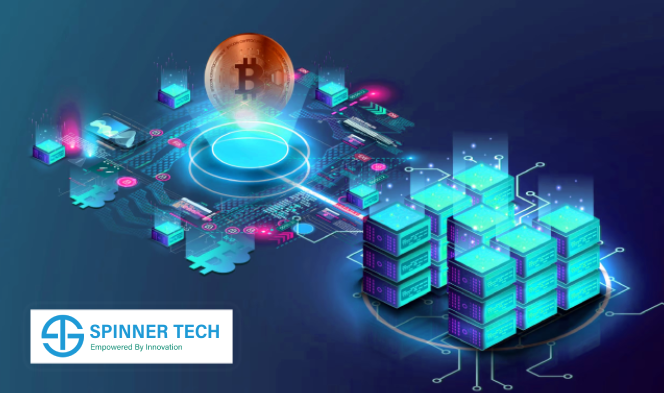Deep dive into the Blockchain Development
By Admin () Last Updated: 01 Feb 2026
Share Now :

Introduction
Blockchain technology has emerged as a transformative force across industries, offering unprecedented opportunities for innovation, transparency, and security. At Spinner Tech, we're passionate about exploring the intricacies of blockchain development and its vast potential to revolutionize various sectors. Let's delve into the fundamentals of blockchain, its key features, applications, and why it's poised to shape the future of digital transactions and beyond.
Understanding Blockchain Technology
Blockchain is a decentralized and distributed digital ledger that records transactions across multiple computers securely and transparently. Each transaction is stored in a "block," which is linked to the previous block, creating a chain of blocks — hence the name "blockchain." This structure ensures that transactions are tamper-resistant and transparent.
Key Features of Blockchain
- Decentralization: Blockchain operates on a decentralized network of computers (nodes), eliminating the need for a central authority or intermediary. This decentralization enhances security, reduces costs, and promotes trust among participants.
- Immutability: Once a transaction is recorded on the blockchain, it cannot be altered or deleted. This feature ensures data integrity and prevents fraud, making blockchain suitable for applications requiring high levels of transparency and auditability.
- Security: Blockchain uses cryptographic techniques to secure transactions and maintain data privacy. Each participant in the network has a unique cryptographic key, ensuring that only authorized parties can access and validate transactions.
- Transparency: Blockchain provides transparency by allowing all participants to view transaction history in real time. This transparency fosters accountability and reduces the risk of disputes or discrepancies.
- Smart Contracts: Smart contracts are self-executing contracts with predefined rules and conditions written directly into code on the blockchain. They automate and enforce the terms of agreements, facilitating secure and efficient transactions without intermediaries.
Applications of Blockchain Technology
1. Cryptocurrencies and Digital Payments
Blockchain gained prominence with the advent of cryptocurrencies like Bitcoin and Ethereum, which use blockchain to enable secure, peer-to-peer digital transactions without intermediaries.
2. Supply Chain Management
Blockchain enhances supply chain transparency and traceability by recording every stage of a product's journey, from raw materials to the end consumer. This improves efficiency, reduces fraud, and ensures compliance with regulatory standards.
3. Identity Management
Blockchain-based identity management solutions offer secure and decentralized storage of personal data, enabling individuals to control and verify their identities without relying on centralized authorities.
4. Financial Services
Blockchain is revolutionizing traditional financial services by enabling faster, more secure, and cost-effective cross-border payments, trade finance, and asset tokenization.
5. Healthcare
Blockchain ensures secure and interoperable health data exchange, improving patient privacy, reducing administrative costs, and enabling personalized medicine through secure data sharing.
Benefits of Blockchain Development
- Enhanced Security: Cryptographic encryption and decentralized consensus mechanisms make blockchain highly secure against hacking and fraud.
- Improved Efficiency: Automation of processes, elimination of intermediaries, and real-time transparency streamline operations and reduce transaction costs.
- Trust and Transparency: A transparent and immutable ledger ensures accountability and trust among participants, reducing disputes and enhancing collaboration.
- Innovation Opportunities: Blockchain's decentralized nature and programmability with smart contracts open doors to new business models and applications across industries.
Getting Started with Blockchain Development
Interested in exploring blockchain development?
Consider these steps:
- Educate Yourself: Gain a solid understanding of blockchain fundamentals, including consensus mechanisms, cryptographic principles, and smart contracts.
- Choose a Platform: Select a blockchain platform (e.g., Ethereum, Hyperledger, or Corda) based on your project requirements, such as scalability, privacy, and development tools.
- Develop Use Cases: Identify specific business problems or opportunities that blockchain can address, such as supply chain transparency or decentralized finance (DeFi).
- Build and Test: Collaborate with blockchain developers to build and test your blockchain solution, ensuring scalability, security, and interoperability.
- Deploy and Iterate: Deploy your blockchain application in a production environment, gather user feedback, and iterate based on insights to optimize performance and user experience.
Conclusion
Blockchain technology is reshaping industries by offering decentralized, transparent, and secure solutions for a wide range of applications. At Spinner Tech, we're committed to harnessing the power of blockchain to drive innovation and create value for our clients. Stay tuned to Spinner Tech for more insights and updates on blockchain development and its transformative impact on the digital economy.


